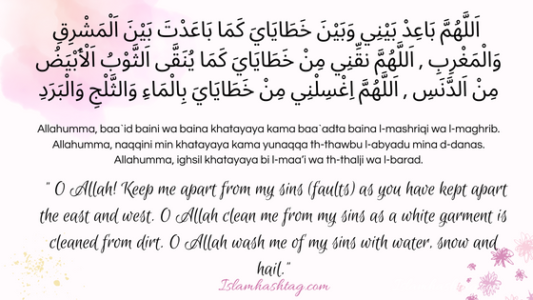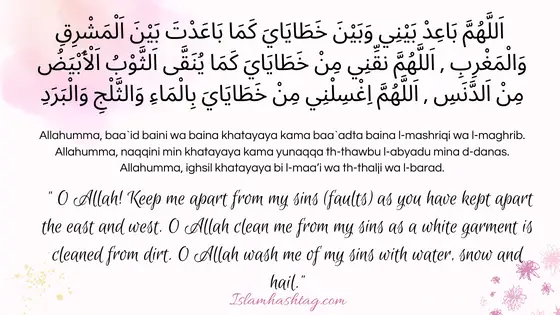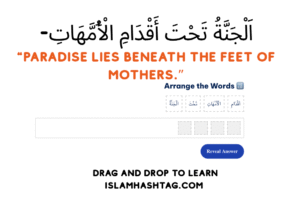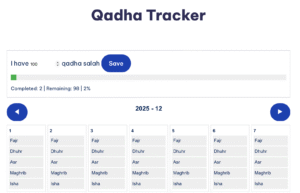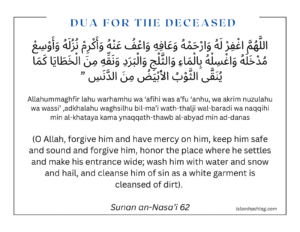Allahumma Baid Baini Dua
Today, I want to share with you a beautiful dua that holds so much significance in our spiritual journey. It’s called “Allahumma baid baini wa baina khatayaya kama baida’ta bainal-mashriqi wal-maghrib”
Listen to the audio of Allahumma Baid Baini Dua:
Allahumma Baid Baini Dua
This is an independent website by a Female scholar.If you benefit from our articles, Help our Projects by buying our Worksheets (Link1) or (Link2) or removing ads. Bookmark our website so that you can visit it daily for(Digital Tasbih) or (Salah Tracker).
There is a hadith,
Narrated Abu Hurairah (RA) Allah’s Messenger (ﷺ) used to keep silent – between the opening Takbir of the prayer and the recitation of the Qur’an – for a short while. Then, I asked him (about that) and he replied, “I say, ‘O Allah! Keep me apart from my sins (faults) as you have kept apart the east and west. O Allah clean me from my sins as a white garment is cleaned from dirt. O Allah wash me of my sins with water, snow and hail.” [Agreed upon].
وَعَنْ أَبِي هُرَيْرَةَ - رضى الله عنه - قَالَ : { كَانَ رَسُولُ اَللَّهِ - صلى الله عليه وسلم -إِذَا كَبَّرَ لِلصَّلَاةِ سَكَتَ هُنَيَّةً , قَبْلِ أَنْ يَقْرَأَ , فَسَأَلْتُهُ , فَقَالَ : “أَقُولُ : اَللَّهُمَّ بَاعِدْ بَيْنِي وَبَيْنَ خَطَايَايَ كَمَا بَاعَدْتَ بَيْنَ اَلْمَشْرِقِ وَالْمَغْرِبِ , اَللَّهُمَّ نقِّنِي مِنْ خَطَايَايَ كَمَا يُنَقَّى اَلثَّوْبُ اَلْأَبْيَضُ مِنْ اَلدَّنَسِ , اَللَّهُمَّ اِغْسِلْنِي مِنْ خَطَايَايَ بِالْمَاءِ وَالثَّلْجِ وَالْبَرَدِ } مُتَّفَقٌ عَلَيْهِ 1
Allahumma Baid Baini Dua meaning and pronounciation
Allahumma, baa`id baini wa baina khatayaya kama baa`adta baina l-mashriqi wa l-maghrib. Allahumma, naqqini min khatayaya kama yunaqqa th-thawbu l-abyadu mina d-danas. Allahumma, ighsil khatayaya bi l-maa’i wa th-thalji wa l-barad.
اَللَّهُمَّ بَاعِدْ بَيْنِي وَبَيْنَ خَطَايَايَ كَمَا بَاعَدْتَ بَيْنَ اَلْمَشْرِقِ وَالْمَغْرِبِ , اَللَّهُمَّ نقِّنِي مِنْ خَطَايَايَ كَمَا يُنَقَّى اَلثَّوْبُ اَلْأَبْيَضُ مِنْ اَلدَّنَسِ , اَللَّهُمَّ اِغْسِلْنِي مِنْ خَطَايَايَ بِالْمَاءِ وَالثَّلْجِ وَالْبَرَدِ
Here is the dua with the word-by-word meaning:
| Arabic | Transliteration | Word-by-Word Meaning |
|---|---|---|
| اَللَّهُمَّ | Allahumma | O Allah |
| بَاعِدْ | baa’id | distance |
| بَيْنِ | bayni | between |
| وَبَيْنَ | wa bayna | and between |
| خَطَايَايَ | khatayaya | my sins |
| كَمَا | kama | as |
| بَاعَدْتَ | baa’adta | you distance |
| بَيْنَ | bayna | between |
| اَلْمَشْرِقِ | al-mashriqi | the east |
| وَالْمَغْرِبِ | wa al-maghribi | and the west |
| اَللَّهُمَّ | Allahumma | O Allah |
| نقِّنِي | naqqini | cleanse me |
| مِنْ | min | from |
| خَطَايَايَ | khatayaya | my sins |
| كَمَا | kama | as |
| يُنَقَّى | yunaqqa | is cleansed |
| اَلثَّوْبُ | ath-thawbu | the garment |
| اَلْأَبْيَضُ | al-abyadu | the white |
| مِنْ | mina | from |
| اَلدَّنَسِ | ad-danas | the dirt |
| اَللَّهُمَّ | Allahumma | O Allah |
| اِغْسِلْنِي | ighsilni | wash me |
| مِنْ | min | from |
| خَطَايَايَ | khatayaya | my sins |
| بِالْمَاءِ | bi l-maa’i | with water |
| وَالثَّلْجِ | wa th-thalji | and ice |
| وَالْبَرَدِ | wa l-baradi | and coldness |
Radhitu Billahi Rabba Dua رَضِيتُ باللهِ رَبَّاً, I am pleased with Allah as my Rabb
Longer Allahumma Baid Baini Dua
It was narrated that ‘Aishah said:”The Messenger of Allah [SAW] often used to say these words in his supplication:
‘Allahumma, inni a’udhu bika min fitnatin-nari, wa ‘adhabin-nari, wa fitnatil-qabri, wa ‘adhabil-qabr, wa sharri fitnatil masihid-dajjal, wa sharri fitnatil-faqri, wa sharri fitnatil-ghina. Allahummaghsil khatayaya bima’ith-thalji wal-baradi wa anqi qalbi minal-khataya kama anqaitath-thawbal-abyada min ad-danasi, wa ba’id baini wa baina khatayaya kama ba’adta bainal-mashriqi wal-maghrib. Allahumma inni a’udhu bika min al-kasali wal harami, wal ma’thami wal-maghram
(O Allah, I seek refuge with You from the tribulation of the Fire and the torment of the Fire, from the tribulation of the grave and the torment of the grave, from the evil of the tribulation of the Al-Masihid-Dajjal, from the evil of the tribulation of poverty and from the evil of the tribulation of richness.
O Allah, wash away my sins with the water of snow and hail, and cleanse my heart from all the sins as you would cleanse white garment from the filth, and put a great distance between me and my sins, as great as the distance You have made between the East and the West. O Allah, I seek refuge in You from laziness, old age, sin and debt.)'”
أَخْبَرَنَا مُحَمَّدُ بْنُ عَبْدِ اللَّهِ، قَالَ حَدَّثَنَا أَبُو أُسَامَةَ، قَالَ حَدَّثَنَا هِشَامُ بْنُ عُرْوَةَ، عَنْ أَبِيهِ، عَنْ عَائِشَةَ، قَالَتْ كَانَ رَسُولُ اللَّهِ صلى الله عليه وسلم كَثِيرًا مَا يَدْعُو بِهَؤُلاَءِ الْكَلِمَاتِ “ اللَّهُمَّ إِنِّي أَعُوذُ بِكَ مِنْ فِتْنَةِ النَّارِ وَعَذَابِ النَّارِ وَفِتْنَةِ الْقَبْرِ وَعَذَابِ الْقَبْرِ وَشَرِّ فِتْنَةِ الْمَسِيحِ الدَّجَّالِ وَشَرِّ فِتْنَةِ الْفَقْرِ وَشَرِّ فِتْنَةِ الْغِنَى اللَّهُمَّ اغْسِلْ خَطَايَاىَ بِمَاءِ الثَّلْجِ وَالْبَرَدِ وَأَنْقِ قَلْبِي مِنَ الْخَطَايَا كَمَا أَنْقَيْتَ الثَّوْبَ الأَبْيَضَ مِنَ الدَّنَسِ وَبَاعِدْ بَيْنِي وَبَيْنَ خَطَايَاىَ كَمَا بَاعَدْتَ بَيْنَ الْمَشْرِقِ وَالْمَغْرِبِ اللَّهُمَّ إِنِّي أَعُوذُ بِكَ مِنَ الْكَسَلِ وَالْهَرَمِ وَالْمَأْثَمِ وَالْمَغْرَمِ ” .
| Reference | : Sunan an-Nasa’i 5466 |
Allahumma Baid Baini Dua Reflection
This dua is like that heart-to-heart conversation with the Almighty.
First off, it’s all about seeking forgiveness. We all make mistakes, right? It’s part of being human. But what’s important is acknowledging those slip-ups and asking for forgiveness.
Now, let’s talk about why we should read this dua often. Think of it as a daily check-in with yourself and with Allah. Just like we brush our teeth every day to keep them clean, reciting this dua regularly helps keep our spiritual selves clean and pure.
By asking Allah to separate us from our sins, we’re not only seeking forgiveness but also renewing our intentions to do better. It’s a reminder that no matter how far we may have strayed, Allah’s mercy is always there, ready to welcome us back with open arms.
Plus, it’s a great way to cultivate humility and gratitude. When we recognize our own shortcomings and ask for forgiveness, it brings us closer to Allah. And the more we strengthen our connection with Him, the more at peace we feel within ourselves.
So, my friends, let’s make it a habit to recite this beautiful dua often. Let’s turn to Allah with sincerity, seeking forgiveness, and renewing our commitment to live our best lives. Because when we do that, we’re not just cleansing our hearts – we’re nourishing our souls.
Remember, Allah’s mercy knows no bounds. So, let’s embrace it, let’s cherish it, and let’s keep striving to be the best versions of ourselves.
Discover more from Islam Hashtag
Subscribe to get the latest posts sent to your email.

